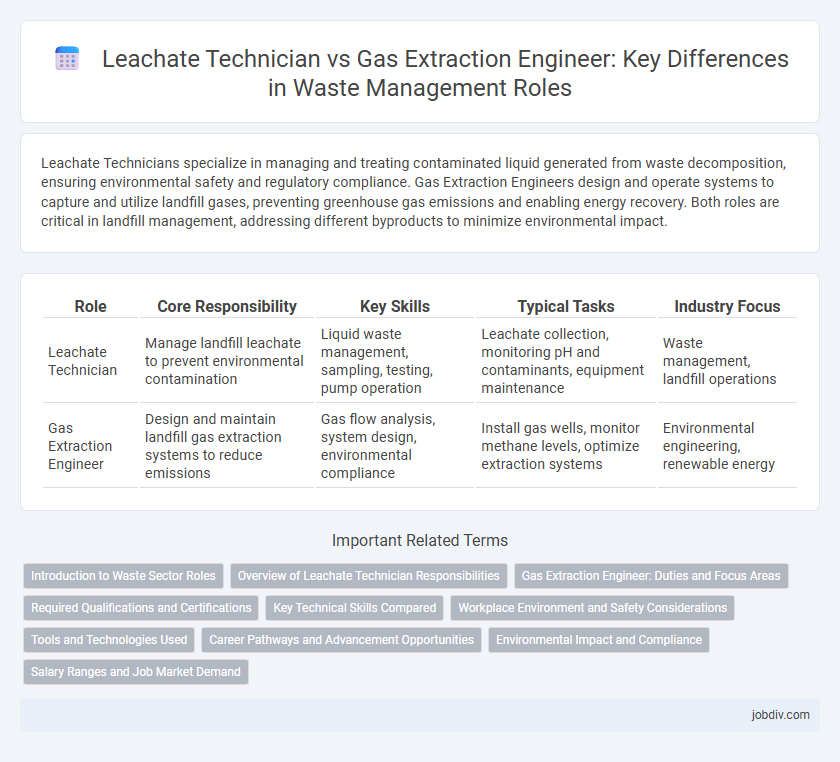Leachate Technicians specialize in managing and treating contaminated liquid generated from waste decomposition, ensuring environmental safety and regulatory compliance. Gas Extraction Engineers design and operate systems to capture and utilize landfill gases, preventing greenhouse gas emissions and enabling energy recovery. Both roles are critical in landfill management, addressing different byproducts to minimize environmental impact.
Table of Comparison
| Role | Core Responsibility | Key Skills | Typical Tasks | Industry Focus |
|---|---|---|---|---|
| Leachate Technician | Manage landfill leachate to prevent environmental contamination | Liquid waste management, sampling, testing, pump operation | Leachate collection, monitoring pH and contaminants, equipment maintenance | Waste management, landfill operations |
| Gas Extraction Engineer | Design and maintain landfill gas extraction systems to reduce emissions | Gas flow analysis, system design, environmental compliance | Install gas wells, monitor methane levels, optimize extraction systems | Environmental engineering, renewable energy |
Introduction to Waste Sector Roles
Leachate Technicians specialize in managing and treating liquid runoff from landfills, ensuring environmental compliance and preventing soil and water contamination. Gas Extraction Engineers design and maintain systems to capture and utilize landfill gases like methane, reducing greenhouse gas emissions and generating renewable energy. Both roles are critical in the waste sector for sustainable landfill management and environmental protection.
Overview of Leachate Technician Responsibilities
Leachate Technicians are responsible for monitoring, collecting, and treating landfill leachate to prevent environmental contamination. They ensure adherence to regulatory standards by operating treatment systems, conducting tests, and maintaining records of leachate quality. Their role is crucial in managing landfill liquid waste, minimizing pollution risks, and supporting sustainable waste management practices.
Gas Extraction Engineer: Duties and Focus Areas
Gas Extraction Engineers specialize in designing and managing systems that capture and control landfill gas emissions, primarily methane, to reduce environmental impact and generate renewable energy. Their duties include monitoring gas wells, optimizing gas collection infrastructure, ensuring compliance with environmental regulations, and analyzing gas quality and flow rates. They play a crucial role in enhancing landfill gas recovery efficiency and minimizing greenhouse gas emissions from waste sites.
Required Qualifications and Certifications
Leachate Technicians typically require certifications in hazardous waste management, confined space entry, and water treatment operations, often holding OSHA HAZWOPER training to handle toxic liquids safely. Gas Extraction Engineers generally possess engineering degrees in environmental, chemical, or mechanical fields along with certifications in gas monitoring, landfill gas control, and environmental compliance standards like RCRA and EPA guidelines. Both roles demand strong knowledge of environmental regulations, but Gas Extraction Engineers require advanced technical credentials related to gas extraction systems and emission control technologies.
Key Technical Skills Compared
Leachate Technicians specialize in managing the collection and treatment of leachate from landfill sites, possessing expertise in wastewater analysis, pump maintenance, and chemical treatment processes to prevent environmental contamination. Gas Extraction Engineers focus on designing and maintaining systems for capturing landfill gas, utilizing knowledge in gas flow dynamics, well drilling, and flare system operations to optimize methane recovery and reduce greenhouse gas emissions. Both roles require strong understanding of environmental regulations, data monitoring systems, and health and safety protocols specific to landfill management.
Workplace Environment and Safety Considerations
Leachate Technicians primarily work in wet, confined spaces such as landfill liners and treatment plants, requiring stringent protective gear to prevent chemical exposure and skin irritation. Gas Extraction Engineers operate in more open environments around landfill sites, focusing on managing methane gas emissions and ensuring proper ventilation to mitigate explosion risks. Both roles demand rigorous safety protocols, but Leachate Technicians face higher risks from liquid contaminants while Gas Extraction Engineers prioritize monitoring gas concentrations and air quality.
Tools and Technologies Used
Leachate Technicians primarily utilize pumps, liners, and chemical analyzers to manage and treat contaminated liquid from waste sites, ensuring proper containment and environmental safety. Gas Extraction Engineers employ gas collection wells, vacuum pumps, and flare systems to capture and control landfill gases, preventing hazardous emissions and facilitating energy recovery. Both roles rely on advanced monitoring software and remote sensing technologies to optimize waste site management and regulatory compliance.
Career Pathways and Advancement Opportunities
Leachate Technicians specialize in managing and treating liquid waste byproducts, gaining expertise in fluid dynamics, environmental regulations, and water treatment technologies, which can lead to roles such as Environmental Compliance Specialist or Wastewater Treatment Manager. Gas Extraction Engineers focus on capturing and processing landfill gases, developing skills in gas collection systems, renewable energy integration, and emissions control, providing pathways toward becoming Landfill Operations Manager or Renewable Energy Project Engineer. Both careers offer advancement through certifications like Certified Hazardous Materials Manager (CHMM) and opportunities to transition into broader environmental engineering or sustainability consulting roles.
Environmental Impact and Compliance
Leachate Technicians specialize in managing and treating landfill leachate to prevent soil and groundwater contamination, ensuring compliance with environmental regulations such as the Resource Conservation and Recovery Act (RCRA). Gas Extraction Engineers design and optimize landfill gas collection systems to control methane emissions, reducing greenhouse gas impact and meeting standards set by the Environmental Protection Agency (EPA). Both roles are critical for minimizing environmental pollution and maintaining regulatory compliance in waste management operations.
Salary Ranges and Job Market Demand
Leachate Technicians typically earn between $40,000 and $60,000 annually, reflecting their niche role in managing liquid waste treatment systems, while Gas Extraction Engineers command higher salaries ranging from $70,000 to $100,000 due to their specialized expertise in landfill gas recovery and energy conversion. The job market demand for Gas Extraction Engineers is growing steadily, driven by increasing environmental regulations and the push for renewable energy sources, whereas demand for Leachate Technicians remains stable but limited to municipal waste management sectors. Employers prioritize candidates with technical skills in environmental engineering and compliance for both roles, with Gas Extraction Engineers benefiting from emerging green technology projects.
Leachate Technician vs Gas Extraction Engineer Infographic

 jobdiv.com
jobdiv.com